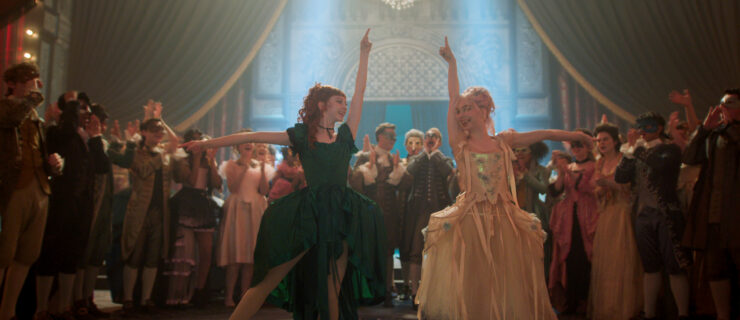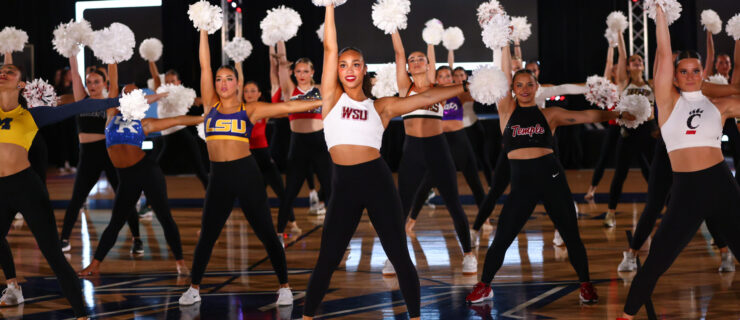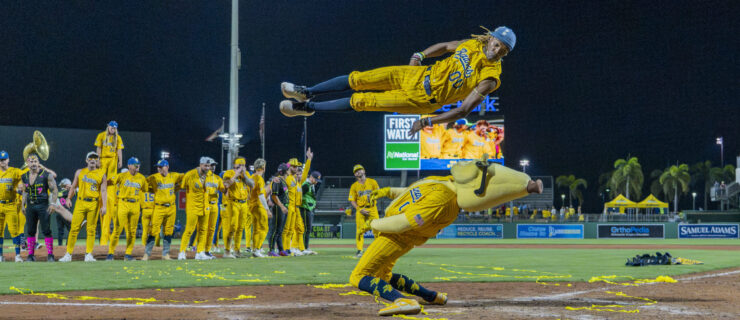Becoming Billy Elliot
Their dance bags are so jam-packed they’re on wheels. The three boys who play the title role in Billy Elliot the Musical haul all the usual ballet gear plus heavy clogging shoes, 110-page scripts and—we might as well just say so—the weight of an entire Broadway show.
For 14-year-old David Alvarez, 13-year-old Trent Kowalik and 14-year-old Kiril Kulish, schlepping dance bags around 42nd Street is the easy part. Even a brief glimpse inside the little theater where they were rehearsing last summer made two things clear. First, there are many ways of being Billy. Second, they all require intense effort. Which is why, when the show has its official NYC opening on November 13, Kiril, Trent and David will be alternating as Billy instead of tackling him full-time.
David, a pensive type with dark curly hair who was among our top 10 ballet teens to watch (“The Next Generation,” March 2008), and Trent, a champion step dancer with freckles and an impish smile, were on the small stage erected in the theater’s lobby. Kate Dunn, the Australian-born, Royal Ballet–trained associate choreographer, was coaching them through the falling and twisting section of an expressive tap number. Meanwhile, elegant, fair-haired Kiril, another dance phenom, was upstairs on the main stage wearing boxing gloves and rehearsing a scene in the rough northern accent called Geordie—“ballet” comes out “balee” and “okay” sounds like “okeh.”
There was more. In addition to tapping, boxing and acting (in Geordie!) under the direction of Stephen Daldry, the boys were mastering Peter Darling’s ballet sequences, the Elton John/Lee Hall songs, and the acrobatics—including soaring overhead on a wire during the show’s climactic number, “Electricity.” All this will keep them onstage for a full two-and-a-half hours. Being Billy is more taxing and requires more versatility than most of the adult roles in Broadway musicals.
No worries. Trent, Kiril and David, who competed with some 1,500 others in open auditions, arrived on Broadway with resumés many adults would envy. “They’re incredibly professional,” Dunn says. “They’re really together. They wouldn’t cope if they weren’t.”
Billy Elliot
, in case you somehow missed the Oscar-nominated 2000 movie (also directed by Daldry and choreographed by Darling), follows an 11-year-old English boy from the hardscrabble streets of a coal mining town into the dance studio of a spunky ballet teacher and then, despite the roadblocks placed in his path by hostility and poverty, to the elite Royal Ballet School.
Billy dreams of ballet as his father and brother are caught in the bitter miners’ strike that disrupted the United Kingdom in 1984. His life couldn’t be more different from those of the three suburban, middle-class American kids playing him—they are so far from the scarred, sooty landscape Billy knows.
But they have no problem identifying with the character, they say. David, on scholarship at American Ballet Theatre’s Jacqueline Kennedy Onassis School, sees some of his own passion reflected in Billy. “From the first class,” he says, “I’ve loved ballet.”
For Kiril, whose definition of triple threat includes ballroom and piano, the touchstone is Billy’s dynamism. “He never stops moving,” Kiril says. “He always wants to dance. Teachers tell me, ‘It’s enough, stop.’ But even at midnight, when I come home, I still really want to move.”
Trent, who performed the starring role in the hit London production of Billy Elliot last year, agrees that when it comes to dancing, Billy’s life echoes his own. But that’s where the resemblance ends. “My family is really supportive of me dancing, unlike Billy’s.”
A supportive family is a necessity, because dance at this level can be disruptive. Kiril moved to NYC with his mother to be Billy, leaving his father behind in San Diego. When David won his scholarship to the JKO school two years ago, the whole family relocated—also from San Diego—to NYC. Trent was already living nearby when he got the Billy Elliot gig, but then he was chosen to do it in London, and his mother stayed there with him for a month. Afterward, he lived in a house with the other children in the cast.
Now, Trent texts friends across the Atlantic. As for his non-showbiz friends, they’ve always been cool with his dancing, he says.
Kiril and David, who both trained in San Diego with Maxim Tchernychev, tell a different tale. “My friends at school used to laugh at me,” says David, whose parents came to the United States from Cuba via Canada, which is where David was born. Kiril, whose family emigrated from Ukraine and who pronounces his name Russian-style, with a hard R, nods: “I get teased a lot,” he says.
Coming from an arts-mad household, Kiril started piano at 5, ballet at 6 and quickly added ballroom, in which he has a flourishing competition career. He danced with the San Diego Academy of Ballet’s junior company for eight years. But when he started rehearsing for Billy, tap, acting and singing were brand new to him. “It was a challenge for me to learn everything, but now it’s really easy for me,” he says. “And I can’t stop tapping. All I want to do is tap.” As for the flying, he calls it “one of the funnest things I’ve ever done. Really scary and fun.”
David loves the flying, too, and he agrees it can be frightening. “The first time I did it, I thought I was going to fly off and crash into the wall.” Now that he’s got it under control, he realizes that it’s helping to strengthen his upper body, “so when I do turns in ballet, it’s all very well-placed.” Like Kiril, David is a talented pianist. But ballet is his central focus, and he has already danced professionally with ABT in The Sleeping Beauty and The Nutcracker. Even the tap he learned for Billy Elliot feeds into his ballet: “It’s made me more musical. I can hear the beats better.”
Tapping isn’t new to Trent, who was, at 11, the youngest American male to win the World Irish Dancing Championship in Belfast, Northern Ireland. He was just a toddler in suburban New York when his sisters started Irish step dance, and he tried to follow in their footsteps. He wasn’t old enough. “So I started ballet and tap when I was 3,” he says. “I added Irish when I was 4.” He likes it all, he says, “but I was more serious about my Irish step dancing.” Ask Trent about his idols and you hear Michael Flatley, Savion Glover, Gene Kelly. Ask the other boys and you hear Mikhail Baryshnikov and Fernando Bujones.
Nobody would mind growing up to be honored and admired. And the stars of Billy Elliot might just make it. But getting older has a downside for them. As soon as they grow too tall, or their voices change, they will be replaced. “We’re training new kids all the time,” says Eric Fellner, one of the producers. It’s a sad fact for David, Kiril and Trent. But it’s good news for boys ready to take their dancing shoes to the Great White Way. Tappers, street dancers and, of course, ballet students can all audition. And don’t forget to put that dance bag on wheels.
Sylviane Gold has reviewed theater and dance for numerous publications and writes the monthly “On Broadway” column for
Dance Magazine.



